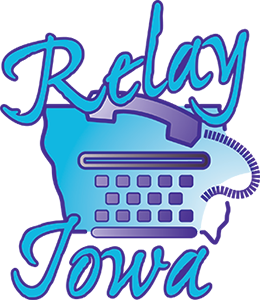
Relay Iowa is a telephone relay service that links people who are hearing, deaf, hard of hearing, or have speech difficulties with one another for communication over the telephone.
For information on how to use the service, visit Relay Iowa.
To use Relay Iowa, simply dial 711 or call using any of the following methods:
TTY/ASCII - 800-735-2942
Voice - 800-735-2943
Speech-to-Speech (STS) - 877-735-1007
Visually Assisted Speech-to-Speech (VA STS) 800-855-8440
Voice Carryover (VCO) - 800-735-4313
Spanish Relay - 800-264-7190
Relay Iowa Customer Service:
English - 888-516-4692
Spanish - 866-744-7471
CapTel Customer Service:
English - 888-269-7477
Spanish - 866-670-9134
To call one-line CapTel user:
English - 877-243-2823
Spanish - 866-217-3362
If you have questions about CapTel service or Relay Iowa, email Lori Sporrer, Relay Iowa Outreach Project Manager, at lori.sporrer@hamiltonrelay.com or contact Relay Iowa customer service at :
1006 12th St.
Aurora, NE 68818
Voice/TTY: 888-516-4692
Spanish Voice/TTY: 866-744-7471
Fax: 402-694-5110
Email: iarelay@hamiltonrelay.com
For information on what is happening in telecommunications relay services on the national front, visit the Disability Rights Office, a division of the Federal Communications Commission's Consumer & Governmental Affairs Bureau. Also see the FCC’s webpage describing telecommunications relay service.
The law that established the Iowa telecommunications relay service is Iowa Code chapter 477C.
Video Relay Service
Video Relay Service (VRS) allows people whose first language is American Sign Language (ASL) to be able to communicate through telecommunications using their native language. By using video equipment, ASL users are able to communicate with voice telephone users by "speaking" directly to specially trained operators via video. The video link allows the operator to view and interpret the party's signed conversation and the operator, in turn, speaks to the hearing party to confidentially relay the message being signed by the person using ASL.
To use most VRS services, you must have a computer or television with a video camera device and high-speed internet access. For specific requirements, contact the VRS provider of your choice. When using Video Relay Service, VRS users are not limited to their state's designated relay provider; they may choose any VRS provider without restrictions, provided the user has the proper equipment. The FCC currently has exclusive jurisdiction over VRS and VRS providers; see the FCC website for further details.
Internet Relay Service
Internet Relay provides internet users the ability to communicate via the relay service through web access, rather than with a TTY or telephone.
When using Internet Relay Service, TRS users are not limited to their state's designated relay provider; they may choose any internet relay provider without restrictions, provided the user has the proper equipment.
The FCC maintains a list of providers on its website. The FCC currently has exclusive jurisdiction over internet relay service and internet relay providers; see the FCC website for further details.